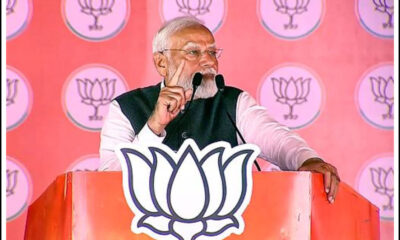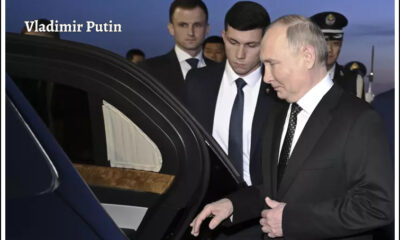Health
the Indian government calls same-sex marriage “elitist”
Published
1 year agoon

The Indian government has expressed its opposition to same sex marriage as the supreme court begins hearings on the rights of LGBTQ people to marry.The Indian government has expressed its opposition to same-sex marriage as the supreme court begins hearings on the rights of LGBTQ people to marry
The Supreme Court of India will hear cases pertaining to the legal right of LGBTQ individuals to marriage.
As the supreme court opens hearings on the rights of LGBTQ individuals to be married under the law, the Indian government has declared its intense opposition to the legalisation of same-sex marriage, calling it a “urban elite concept” that undercuts religious and societal norms.
As part of a group lawsuit fighting for LGBTQ people’s right to marriage and legal equality, scores of petitions from LGBTQ couples and activists were presented to the nation’s top court on Tuesday.
It is the most major challenge to the status quo of gay rights since the supreme court invalidated a colonial-era law criminalising homosexuality in a landmark decision in 2018.
Read Also:- Kangana Ranaut claims that Aamir Khan was her “best buddy.”
The same-sex marriage hearings take place at a time when India is gradually changing in a way that makes LGBTQ individuals more visible, especially in popular culture and at pride marches staged in major cities, and where there is a growing understanding of the right to equality. The majority do acknowledge that there is still a long way to go before there is complete societal acceptance and protection from discrimination and harassment, given how thoroughly traditional and patriarchal the nation is.
As India decriminalises homosexuality, activists rejoice.
Learn more.
The marriage problem has been deemed to be of “seminal importance” by the chief justice, and a five-judge panel will hear the case, which is anticipated to last at least two weeks.
The Hindu nationalist administration, headed by Prime Minister Narendra Modi, filed a vehement affidavit with the supreme court on Monday, declaring its opposition to same-sex unions and requesting that the case be dismissed.
The government argued that any equality granted to same-sex couples went against religious values and “seriously affected the interests of every citizen,” and that such a decision should be made by parliament and not the courts. “A valid marriage is only between a biological male and a biological woman,” the government’s submission stated.
Also, the Modi administration recently challenged the appointment of a gay attorney to the supreme court on the grounds of his sexual orientation.
The attorneys and petitioners who filed the complaint expressed optimism about its prospects, pointing out that the highest court has upheld important LGBTQ rights decisions over government resistance, including one in 2014 that recognised transgender individuals as a “third gender.”
Kavita Arora and Ankita Khanna, a Delhi-based couple who have been together for 11 years and met while working together before falling in love, are among those defending the case.
They brought the case because they needed a joint bank account, to give each other medical consent, and to be recognised legally for inheritance. However, they also did so because they “fundamentally believe that India as a democracy is a place for diversity, equality, and justice for all, and under the constitution our rights are no less than others,” according to Khanna.
“As we have grown together,” Arora continued, “we’ve recognised that marriage in our nation and in our society signifies a lot of significant things: It offers a sense of social acknowledgment, a sense of validation, and legally it sanctions a whole lot of different privileges that LGBTQ couples are denied.”
After being denied their initial try at a civil union wedding in September 2020, the pair decided to file a lawsuit. “We do believe that the judiciary is fair, so we reasoned that we shouldn’t only complain about it. The top court should discuss it, according to Arora.
In a nation like India, where marriage carries significant social capital and is practically the foundation of society, Arora and Khanna, who both specialise in child mental health, said that allowing same-sex marriage couples to marry would be a historic step towards acceptance.
We came to the realisation that this isn’t just about us, Khanna added. This is about so many of the young kids we encounter and the kind of future they ought to have without believing that, simply because they are gay, they aren’t capable of having an identity and a life.
In Asia, India would only be the second nation after Taiwan to legalise same-sex unions. One of the attorneys arguing the case, Menaka Guruswamy, who was also a driving force behind the decriminalisation of homosexuality lawsuit in 2018, stated that she had “full faith in the court.”
The lawsuit involves a number of issues, including not only marriage but also same-sex couples’ ability to adopt children and their families’ entitlement to equal parental rights. The National Commission for the Protection of Children has also opposed this issue in a submission to the Supreme Court, stating that “allowing adoption to same sex couples is comparable to endangering the children.”
The case also seeks to overturn a prior ruling by the Supreme Court and asserts the rights of transgender persons to have the families and partnerships of their choosing recognised in law.
The restriction of marriage to LGBTQ persons “makes a mockery of our constitution and renders us second class citizens,” said Zainab Patel, a trans woman who is one of the petitioners.
The case has implications for LGBTQ couples as well as for equality under the constitution and the freedom to marry whoever you choose, regardless of gender, religion, or caste, according to Rohin Bhatt, another lawyer involved in the litigation who identifies as queer. This is particularly important at a time when interfaith and intercaste marriages are being attacked by the Hindu right wing.
Hearing the government’s arguments against same-sex marriage, according to Bhatt, is “dehumanising and disenfranchising,” and they “embolden homophobia,” he claimed. As it moved the nation away from the democratic principles of the constitution and towards the rule of religion, he saw it as a component of a larger aim of the Modi administration.
Citizens’ fundamental rights are at issue, according to Bhatt. The only thing queer people in this nation are requesting is that the same privileges that are granted to heterosexual couples be offered to us.
As you are joining us from India and 2023 is quickly approaching, we have a small favour to ask. New opportunities come with a new year, and we’re hoping that this year ushers in some much-needed stability and advancement. The Guardian will be there, offering clarity and unflinching, independent reporting from all over the world, around-the-clock.
We are aware that not everyone can afford to pay for news because times are hard. Yet, because we are reader-funded, we are dependent on the continuous generosity of those who can. Due to this crucial help, millions of people may continue to read dependable news coverage of the global events. This year, are you going to invest in the Guardian?
We don’t have a wealthy owner like many others, so we may pursue the truth boldly and report it honestly. The year 2023 won’t be any different; we’ll continue to work tirelessly and passionately to offer you journalism that is never influenced by business or politics. Nothing changes our editor or calls our focus away from what’s most crucial.
We’ll keep Guardian journalism accessible and free to read for everyone with your help. More people can comprehend global events and their effects on people and communities when information access is equalised. Together, we can push for democracy and demand more from the wealthy.
Your financial support, no matter how small or large, will be crucial in sustaining our reporting for years to come. Please consider making a monthly donation of as little as $2 to help us. Setting it up takes less than a minute, and you can be confident that every month, you’re helping to support free, independent news. I’m grateful.
You may like
-


On the Citizenship Amendment Act (CAA), PM Narendra Modi challenges Congress and the SP
-


Shortly After Slovak PM’s Assassination, As Crowd Held Gunman
-


Vladimir Putin, the leader of Russia, makes a state visit to China as a symbol of the alliances’ solidarity
-


NASA: Bright, tiny, plant-like creatures discovered in the Celtic Sea
-


Earth’s North Pole is moving more quickly
-


Kiara Advani will make her Cannes Film Festival debut in 2024

